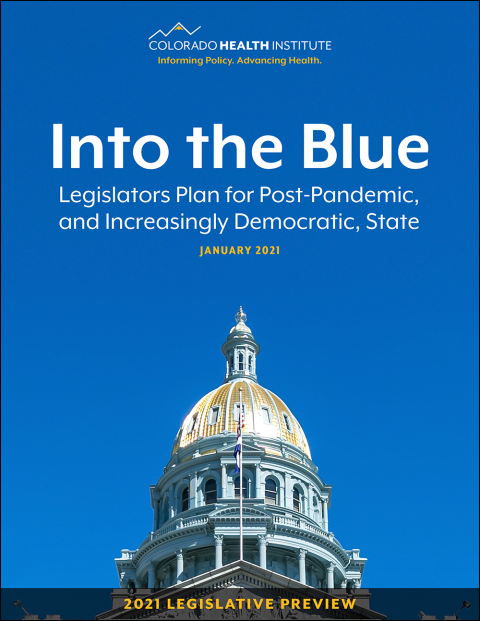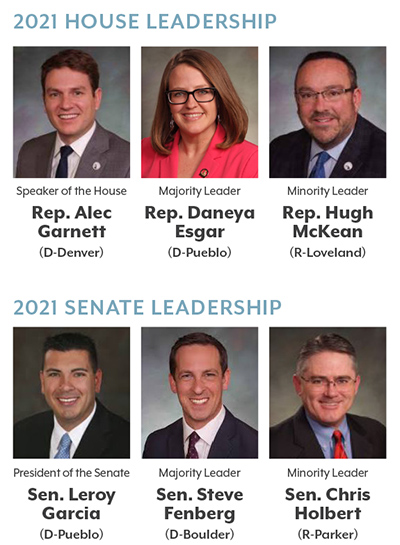Bills and Issues to Watch
Bills to Expect
As 2021 progresses, how might “COVID policy fatigue” affect the session? Considerable time and energy have already been dedicated to urgent policy actions in response to the pandemic, though challenges persist. COVID’s impacts and the state’s response will loom over the session and could push aside other policy conversations, such as those related to hospital financial reform.
But it appears that despite the pandemic, the session will be an active one for health policy. Many health bills are expected, and many of them will look familiar from the 2020 regular session. If not for the pandemic, it’s likely that some of these proposals would have already been signed into law.
While by no means a comprehensive list, the following is an overview of important health policy topics for the year ahead.
The Big Three
Public Option
Conversations around creating a public insurance option — which instead became known last session as a “state option” — have taken center stage at the Capitol for several years. A new public option proposal will be introduced in 2021, and the governor signaled his support for the idea by calling it out as a priority in his budget request. Health policy watchers generally agree that this will be the most anticipated, and one of the most controversial, bills this session.
During the 2020 session, House Bill (HB) 20-1349 called for a state-designed insurance plan to be offered by private carriers. The plan would achieve affordable premiums through savings from hospital rate setting for services provided to its enrollees, and at least two insurers would be required to offer coverage in each county of the state.
Industry representatives were not supportive of the approach, and both hospitals and insurers prepared for a fight at the Capitol. Hospital advocates instead floated a proposal for a “total cost of care” model, which they said was more fair. (Notably, hospitals are not planning to bring this bill back in 2021.) But then COVID-19 interrupted the session, hospital finances changed drastically, and sponsors announced during the legislative recess that they were withdrawing the bill.
A similar group of legislators is likely to carry the new version of the bill in 2021, though the program’s design will differ. Sponsors are likely to propose a “true” public option — allowing people to buy in to the Medicaid program or something else administered by the state, almost certainly under HCPF, instead of last year’s public-private hybrid structure. The funding could and likely will look different, as sponsors can consider federal, state, and industry sources to pay for the plan. Other states, for example, have proposed using ACA waivers to reallocate federal funds for a state-level public option.
Prescription Drug Pricing
While Polis and Democratic leaders have made progress on many of their top health policy goals in the past two years, success in addressing pharmaceutical prices has eluded them. Legislators did pass a high-profile bill (HB 19-1216) to cap the price of insulin for Coloradans enrolled in state-regulated health insurance plans, but broader attempts to increase transparency or save consumers money have failed to gain traction.
Pharmaceutical companies are in the crosshairs of the governor’s office, and Polis’ budget request indicates interest in considering options up for discussion in other states.
A forthcoming bill will propose the creation of a Prescription Drug Affordability Board. The effort, led by the Colorado Consumer Health Initiative, was planned for last year but was never introduced. The new board would include experts on health care and prescription drugs with no conflict of interest in industry. Its five members would conduct affordability reviews and, most notably, it would have the authority to set upper payment limits for the most unaffordable prescription drugs in Colorado.
Rep. Dylan Roberts (D-Avon) intends to bring another bill focused on the price of insulin for uninsured Coloradans and those on insurance plans regulated at the federal level or by other states. In addition, recent bills to require greater transparency — such as a 2020 effort to create the “Colorado Prescription Drug Price Transparency Act” — may be back, as may bills targeting pharmaceutical rebate practices.
Elected officials across the political spectrum want to do something about unaffordable prescription drug prices, so this topic may present a strong opportunity for bipartisan collaboration.
Behavioral Health
Even before the arrival of a global pandemic, more than a million Coloradans were struggling with behavioral health conditions — and COVID-19 has only exacerbated stresses related to mental health and substance use. The House has even renamed one of its two health committees to emphasize a focus on this issue: the Public and Behavioral Health and Human Services Committee.
Recent discussions in the legislature and work by the bipartisan Interim Committee on Opioid and Other Substance Use Disorders have made clear that the political will exists to tackle behavioral health needs and gaps in most areas, though some harm reduction efforts — like a proposal for supervised use sites — have proven too controversial at the Capitol. The bigger constraint in 2021 will be a lack of funding. While a group of notable bills passed last session to address substance use issues, many of the bills had the bulk of their funding stripped due to COVID-caused economic hardship. Since then, a variety of behavioral health programs have been delayed or recommended for budget cuts.
All eyes are on the Behavioral Health Task Force, a group convened by the governor that produced a report in September outlining problems and policy recommendations. For example, the Task Force identified that the $1.4 billion the state spends on behavioral health is spread across 10 agencies and at least 75 programs. Not only is this inefficient, according to its members, but the dispersed programs put a burden on people seeking services to navigate a complex system.
A bill this session will direct the Colorado Department of Human Services to draft a proposal for a streamlined Behavioral Health Administration, which would be created in 2022. The proposal would include recommendations for alignment between the Administration and both Medicaid and private insurers, which would continue to function separately.
Also expected: the return of recent bills to require free, annual mental health wellness exams for Coloradans; to define the role of peer support professionals; to institute protections for secure transportation for people experiencing a behavioral health crisis; and to fund a pilot program to place more social workers in Colorado schools.
Other Notable Health Legislation
Supporting Health Care Providers
Health care providers have been under tremendous stress during the pandemic, and a handful of bills will aim to help them in different ways. In light of threats targeting everyone from nurses to Dr. Anthony Fauci, the director of the National Institute of Allergy and Infectious Diseases and the face of the U.S. pandemic response, a bill from the Colorado Association of Local Public Health Officials will seek to add public health workers to the list of professionals who are protected from having their personal information posted online. There likely will be legislation to protect confidentiality for health care providers who choose to access peer assistance program services, as advocates say that a failure to do so could have a chilling effect on doctors seeking support during challenging times. Expect legislation that eliminates the legal requirement for physician supervision of Physician Assistants, often called PAs, with at least three years of experience, but allows practices to establish their own supervision standards. And there may be bills or other proposals to support direct care workers, such as home health aides or personal care assistants, who have been stretched thin and underpaid since long before the pandemic.
Improving Technology
Technology has been a lifeline for many patients while in-person visits have been unsafe or largely inaccessible. Telehealth usage has surged since March, including among providers who hadn’t conducted remote visits previously. Policymakers want to ensure continued access to care and data integrity. While last spring’s successful Senate Bill (SB) 20-212 codified some temporary telehealth rule changes, uncertainty remains. Some state leaders question the necessity and sustainability of Colorado’s payment parity rule, passed in 2015, which requires equal reimbursement rates for in-person and virtual visits. HCPF had planned to bring legislation proposing some type of change to this rule, but ultimately reversed course and left tackling telehealth parity off the final version of its 2021 legislative agenda. However, there may be other telehealth-focused bills, including one seeking to expand the use of teledentistry. In addition, a likely bill would propose a process for streamlining and automating public health data reporting, which proponents say would improve data quality while lessening the burden on overworked health care providers.
Protecting Consumers
The governor and legislative leaders have been open about their desire to pass policies protecting consumers, regardless of industry opposition. (See, for example, successful recent bills to create a reinsurance program, mandate more hospital financial reporting, and the ongoing pursuit of a public option.) This session will feature additional bills aimed at consumer protection. For instance, an effort led by the Colorado Center on Law and Policy would require better compliance and enforcement for a hospital discount program that consumer advocates feel is not working as intended. The House Health and Insurance Committee Chair, Rep. Susan Lontine (D–Denver), will once again sponsor a bill targeting health care sharing arrangements (often known as health care sharing ministries), which have been the subject of recent consumer advisories and cease-and-desist orders from the Division of Insurance (DOI). And more work is expected on regulating out-of-network (or “surprise”) billing practices, which are also being targeted at the federal level. Details aren’t yet available, though groups that backed HB 19-1174 — a breakthrough in tackling surprise bills — are likely to collaborate again.
Increasing Access to Services
Several bills in 2020 proposed adding benefits to the list of those covered by insurance companies. Some passed and others stalled out, hurt by both the pandemic and a veto from Polis with a warning that he would not sign additional bills to increase insurance mandates. This session, a returning bill from the Colorado Association of Health Plans would require up-front analysis of any new legislation that adds to the list of covered services — a policy change that could cause some groups to hold off on pushing additional benefit proposals. (Notably, there’s no need for one of the 2020 mandate bills to come back. It had proposed lowering the age for covered colon cancer screenings, but after the session that change was made at the national level, making a state policy change unnecessary.) In this category, there will also be a bill from the Colorado Organization for Latina Opportunity and Reproductive Rights (COLOR) to expand Medicaid coverage to include contraceptives for people without documentation. Several groups are working on maternal health proposals, with a focus on both physical and mental health for people who are pregnant or postpartum. With a pending decision on the legality of the ACA in the Supreme Court, there may also be bills or other discussions about ensuring more state-level protections for parts of the decade-old law.
Addressing Contributing Factors
Health is a broad subject that intersects with many other topics, such as housing, food security, and income. A great deal of “health-adjacent” legislation is in the works. For example, legislators will introduce another slate of housing bills in 2021, including more focus on rental assistance and tenants’ rights. There will be efforts to protect Coloradans against different types of discrimination, such as age-based discrimination in hiring — protections that advocates say are essential when unemployment is high. Conversations about universal preschool and employee classification (and how it affects workers’ benefits) are additional examples. Other bills and budget priorities, including those passed during the special session providing relief for child care, food pantries, and broadband, indicate a larger focus on combatting health inequities in Colorado. Expect racism to increasingly be called out as a public health issue, too.









